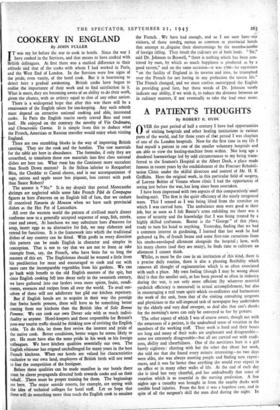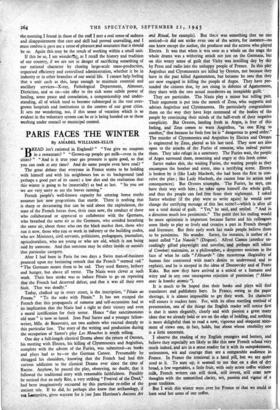A PATIENT'S THOUGHTS
By ROBERT R. HYDE VER the past period of half a century I have had opportunities of visiting hospitals and other healing institutions in various parts of the world, and for three years of that period I was chaplain of one of the London hospitals. Now for the first time in my life I find myself a patient in one of the smaller voluntary hospitals and am able to view the healing-machine from within. Not long ago a duodenal haemorrhage led by odd circumstances to my being trans- ferred to the Seamen's Hospital at the Albert Dock, a place made famous in recent years by the establishment of the Fracture Rehabili- tation Clinic under the skilful direction and control of Mr. H. E. Griffiths. Here the original work, in this particular field of surgery, of Lorenz Bohler of Vienna whose clinic I had the opportunity of seeing just before the war, has long since been overtaken.
I have been impressed with two aspects of this comparatively small healing-unit. The first is the quiet efficiency of the nicely integrated team. This I sensed as I was being lifted from the stretcher on which I was carried here. The ambulance men were good at their job, but as soon as I felt Baxter's arms enfolding me there was a sense of security and the knowledge that I was being treated by a highly skilled craftsman. Baxter is the " George" of this place, ready to turn his hand to anything. Yesterday, finding that we had a common interest in gardening, I learned that last week he had gathered 14 lbs. of french beans and some first-rate carnations from his smoke-enveloped allotment alongside the hospital ; how, with his many chores (and they are many), he finds time to cultivate an allotment I cannot think.
Whilst, as must be the case in an institution of this kind, there is a precise daily routine, there is also a pleasing flexibility which removes all thought of regimentation which is so often associated with such a place. My own feeling (though I may be wrong about this) is that the smaller unit, as has been proved so often in industry during the war, is not only more efficient (by whatever material yardstick efficiency is measured) in actual accomplishment, but also in encouraging a real team spirit which co-ordinates and harmonises the work of the unit, from that of the visiting consulting surgeons and physicians to the self-imposed task of newspaper boy undertaken by the elderly and very deaf sweeper, so deaf alas that one's thanks for the morning's news can only be conveyed to her by gesture.
The other aspect of which I was of course aware, though not with the awareness of a patient, is the undoubted sense of vocation in the members of the working staff. Their work is hard and their hours are long and many of their tasks are unpleasant and disagreeable— some are extremely disagreeable—but all are carried out with readi- ness, ability and cheerfulness. One of the novitiates here is a girl barely eighteen: chatting with her the other day about her work, she told me that she found every minute interesting—no two days were alike, she was always meeting people and finding new experi- ences, and it was far better than anything she would ever expect in an office or in many other walks of life. At the end of each day she is tired but very cheerful, and has undoubtedly that sense of vocation which is so essential in the nursing profession. A few nights ago • a casualty was brought in from the nearby docks with terrible head injuries. From the first it was a hopeless case, and in spite of all the surgeon's skill the man died during the night. In -the morning I found in those of the staff I met a real sense of sadness ana disappointment that care and skill had proved unavailing, and I must confess it gave me a sense of pleasure and assurance that it should be so. Again this may be the result of working within a small unit.
If this be so, I am woncier:TYJ. as I recall the history and tradition of our country, if we are not in danger of sacrificing something of our national character by chasing large-scale mass-production, organised efficiency and centralised administration, whether it be in industry or in other branches of our social life. I cannot help feeling that a unit such as this, large enough to maintain essential and ancillary services—X-ray, Pathological Department, Almoner, Dieticians, and so on—can offer to the sick some subtle power of healing, some peace and consolation, a companionship and under- standing, all of which tend to become submerged in the vast over- grown hospitals and institutions in the centres of our great cities. It sets me wondering, too, if this sense of vocation which is so evident in the voluntary system can be or is being handed on to those working under council or municipal control.























 Previous page
Previous page